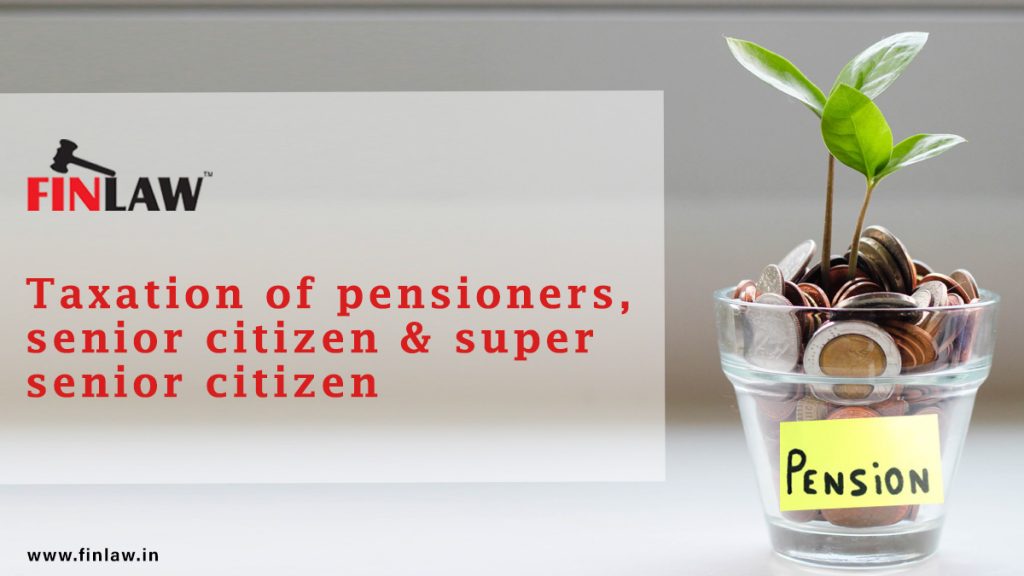ACCOUNTING & TAXATION:
Taxation of Pensioners, Senior Citizen & Super Senior Citizen:
-
PENSION:
Pension is described in section 60 of the CPC and section 11 of the Pension Act as a periodical allowance or stipend granted on account of past service, particular merits etc. Thus, monthly allowance to the younger brother of a ruler was treated as a maintenance allowance and not pension (Raj Kumar Bikram Bahadur Singh Vs. CIT 75 ITR 227(MP)). There are three important features of ‘pension’. Firstly, pension is a compensation for past service. Secondly, it owes its origin to a past employer-employee or master-servant relationship. Thirdly, it is paid on the basis of earlier relationship of an agreement of service as opposed to an agreement for service. This relationship terminates only on the death of the concerned employee.
Pension received from a former employer is taxable as ‘Salary’. Hence, the various deductions available on salary income, including relief u/s 89(1) for the arrears of pension received would be granted to pensioners who received their pension from, a nationalised bank and in other cases their present Drawing & Disbursing Officers. Similarly, deductions from the amount of pension of standard deduction and adjustment of tax rebate u/s 88 and 88B shall be done by the concerned bank, at the time of deduction of tax at source from the pension, on furnishing of relevant details by the pensioner. Instructions in above regard were issued by R.B.I. ’s Pension Circular (Central Service No. 7/C D.R./ 1992(Ref. No. DGBA:GA(NBS) No. 60/GA64-(II CVL-91-92 dated 27.4.92).
Pension to officials of UNO is exempt from taxation. Section 2 of the UN (Privilege & Immunities) Act, 1947 grants tax exemption to salaries/emoluments paid by U.N. The Karnataka High Court had held that u/s 17 of the Income Tax Act, salary has been defined as including pension, therefore, if salary received from U.N. is exempt, so shall be the pension. This decision was accepted by the CBDT vide circular No. 293 dated 10.02.1981.
-
FAMILY PENSION:
Family pension is defined in Section 57 as a regular monthly amount payable by the employer to a person belonging to the family of an employee in the event of death. Pension and family pension are qualitatively different. The former is paid during the lifetime of the employee while the latter is paid on his death to surviving family members. However, in case of family pension, since there is no employer-employee relationship between the payer and the payee, therefore, it is taxed as ‘Income from Other Sources’ in the hands of the nominee(s). In respect of family pension, deduction u/s 57(iia) of Rs. 15000 or 1/3rd of the amount received, whichever is less, is available.
-
SENIOR CITIZEN:
Under the Income Tax Act, a senior citizen is a person who at any time during the previous year has attained the age of 60 years or more. There are certain benefits available to senior citizen under the Income Tax Act:-
(i) The maximum amount not chargeable to tax in respect of senior citizens is Rs.3,00,000. Thus, no tax is payable by a senior citizen if the total income is upto Rs.3 lacs.
(ii) The deduction available u/s 80D for medical insurance premium paid is to be increased to Rs.50,000 for senior citizens. Secondly, the deduction available u/s 80DDB in respect of expenditure incurred on treatment of specified diseases is to be increased to Rs.1,00,000 for senior citizens.
(iii) In order to resolve the tax issues arising out of the reverse mortgage scheme a new clause (xvi) in Section 47 of the I.T. Act which provides that any transfer of a capital asset in a transaction of reverse mortgage under a notified scheme shall not be regarded as a transfer and shall, therefore, not attract capital gains tax. This ensures that the intention of a reverse mortgage which is to secure a stream of cash flow against the mortgage is not contradicted by treating the same as transfer.
The second issue is whether the loan, either in lump sum or in instalments, received under a reverse mortgage scheme amounts to income. Receipt of such loan is in the nature of a capital receipt. However, with a view to providing certainty in the tax regime pertaining to the senior citizens, the section 10 of the Income Tax Act has provide that such loan amounts will be exempt from income tax.
Consequent to these amendments, a borrower, under a reverse mortgage scheme, will be liable to income tax (in the nature of tax on capital gains) only at the point of alienation of the mortgaged property by the mortgagee for the purposes of recovering the loan.
-
SUPER SENIOR CITIZEN :
Under the Income Tax Act, a Super senior citizen is a person who at any time during the previous year has attained the age of 80 years or more. There are certain benefits available to senior citizen under the Income Tax Act: –
(i) maximum amount not chargeable to tax in respect of senior citizens is Rs. 5,00,000/-. Thus, no tax is payable by a Super senior citizen if the total income is up to Rs.5 lacs.
(ii) All benefit discussed in point (ii) & (iii) above for Senior Citizens are also available to Super Senior Citizens.

